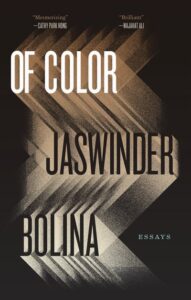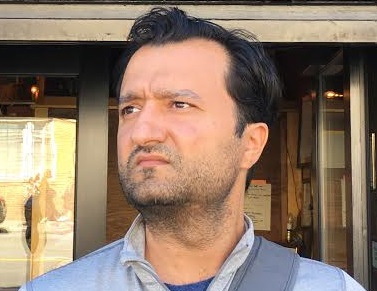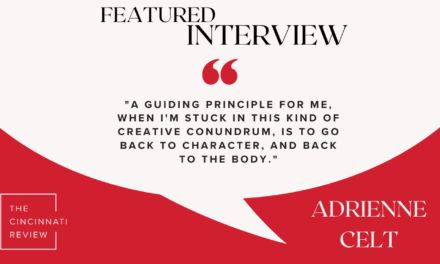
Managing Editor Lisa Ampleman: In his book of essays released last week, Of Color (McSweeney’s, 2020), CR contributor Jaswinder Bolina shows us the problem of racism and the experience of race in America from several different angles. He notes the ironies of being Desi in the US: “No matter whom I superficially resemble or how many English speakers my Sikh name confounds, I’m a citizen bankrolling an empire: a U.S. taxpayer, a voter, a part of the problem.” He looks closely at what happens to writers of color in the literary community and in the classroom, noting both microaggressions and downright aggressions. He thinks about match marriages and assimilation, and he imagines the world his son will live in. Originally published between 2010 and 2020, these essays together pack a powerful punch as they look at the multifaceted polygon that is “color.”
I was glad to be able to correspond with Bolina about those essays and about “Waiting My Turn,” his poem that we published in our miCRo series yesterday:
These essays were written (or at least published) over the span of nearly a decade. What helped you decide to put together an essay collection, and what kind of crafting did the book as a whole involve? (E.g., were there essays that didn’t make the cut? Did you find yourself writing new pieces to fill perceived gaps?)
The book is the culmination of almost ten years of accidental prose. I wrote the essay “Writing Like a White Guy” somewhat unintentionally, and its publication led to a couple requests from other places for more essays, so I wrote a couple more essays. After those, I wrote another on my own—“The Writing Class”—and the process somehow repeated. It kept repeating like this until I almost had enough material to at least contemplate doing a book someday.
At almost precisely that moment, Daniel Levin Becker emailed asking me to contribute a piece to an anthology McSweeney’s was putting out, and he also asked if I’d ever considered doing a collection. He said McSweeney’s might be interested in publishing it. I wasn’t sure how steeply I ought to italicize the might in his query, but I took him up on the chance and sent him every essay I’d ever written in a single doc. I fully expected him to tell me I needed some thousands or tens of thousands of words more or that it didn’t work sensibly as a book, but to my amazement and relief, he didn’t say that. Instead, he began working with me as my editor, and he did so indefatigably for over a year when it turned out his colleagues at McSweeney’s were indeed interested.
During that year, we cut a bunch—sentences, paragraphs, entire essays—and I revised a bunch, including pieces that had been published and widely circulated or anthologized. That editorial back-and-forth clarified a theme, clarified the title, clarified all that was missing, those perceived gaps you asked about that definitely were there. In an effort to fill them, I wrote “American, Indian,” “White Wedding,” and “Coda” (not in that order) across 2018/19. Even with those, I kept finding new gaps to contend with, but at some point I felt like I’d said everything I could say at that moment in my life about race and class and living; not everything that could be said or everything that needed to be said, but everything I felt able to say that might be of any interest to a reader.
Of course, I had no idea what was coming: the virus, the lockdown, the way the worst of its every burden is falling on people of color in the US and abroad, and then the murder of George Floyd and the overdue reckoning and upheaval that have finally begun, that I hope will continue for years to come. So, you see, the gaps are still there, but I’d said all I could say at that moment, and the crafting felt finally finished, so here is this accidental book.

In the first essay in the book, “Empathy for the Devil,” you speak about activism in a way that feels important to the present moment: “I don’t want to engage in easy liberalism, the activist mindset that contemplates, mourns, and criticizes but does nearly nothing to change the conditions that allow atrocity in the first place. Such a mindset might motivate me to vote left of center, to donate to Amnesty International. It might get me to march and to occupy. But it operates at a safe distance, and that distance is part of the problem too.” In what ways can activists (perhaps particularly those in the literary community?) move further, out of that safe distance, and into a push for actual change?
The last two sentences in that paragraph are, “In that space, self-righteousness and cynicism fester. There every atrocity is born.” I wrote that essay in the spring of 2012, which is a different context than now, but the “safe distance” I’m referring to, “that space” I mention, is the one we create between ourselves and our complicity. I don’t think we have enough sense of how much we are part of the problems we rail against, whatever our political leanings. I don’t mean that we’re all willfully ignorant or hypocritical, believing one thing while living another. I mean that our imaginations fail us. Whatever side of the political spectrum we claim for ourselves, we too often take a defensive posture that says the trouble with the world lies somewhere over there while we are over here in a purer, more righteous place. But we’re not. We’re all in the same place, and we’re all part of every problem.
So, I’m meaning to call out over-here-ness versus over-there-ness because I’m almost certain that this is the little malignancy that eventually metastasizes into dehumanization and atrocity. I’m trying to acknowledge that even when I might not be causing a problem, my complicity is baked into the fact that the same forces that permit my life and all the perspectives I believe to be righteous and pure also permit somebody else’s suffering.
But I want to be clear that being part of the problem is different from being the cause of the problem. I can be part of a problem and still do a whole lot to correct it. Still, the first step is to disallow myself from feeling detached via critical distance. The next step is to seek out the opposite, to find proximity. Once I accept that I have the job I have or don’t have, that I live in the place I live, that I speak and dream in one language over another, that I carry on with the friends I know instead of ones I don’t, once I accept that my life is what it is because of genocide and war, because of slavery and segregation and sexism, because of every prejudice, violence, and hate, both current and historical, I suddenly feel much less capable of entirely blaming somebody else for all that’s wrong with the world. More importantly, I feel less able to sit around doing nothing.
Empathy is born of proximity, and proximity forces one to act. It isn’t some wishy-washy abstraction. Empathy is a pragmatic and earthy impulse. And far from being ideological, it necessitates compromise. It’s the condition of being compromised, of losing objectivity—which is a myth to begin with—and when I’m compromised in this way, when I feel what you feel, I might listen to you as much as I listen to myself. I might think and act on your behalf as much as my own. I might vote as much for you as for me, and I’ll march, and I’ll donate, and if it benefits you, I won’t make the perfect the enemy of the good, but once we’ve achieved the good, I’ll return immediately to pursuing the perfect.
At end, I don’t want to tell anyone what their activism should look like, but I know however it is enacted, it needs to be motivated by humility. I think one of the consequences of our American mythos of individualism is that we feel so much of every burden falls entirely on each of us separately. We all want to know, “What can I do?” when the thing we can all do seems pretty straightforward: listen and do what the people you care about are asking you to do. Effective activism is collective. The individual matters so much less than the movement, and the best thing might be to keep our egos in check, to listen and learn, to be allies and accomplices, to live our lives for somebody else’s welfare, whether that means protesting or contributing money or voting or shopping, eating, and otherwise living differently. I think the literary community and progressives in general are starting to do some of these things better than they have in the past, but for whatever progress has been made, 2020 has clearly demonstrated we have a very long way to go.
In (the thrice-anthologized) “Writing Like a White Guy,” you describe the dichotomy of “writer”/”minority writer” that poets of color often face: the “writer” uses “a language assigned to somebody else while downplaying the issue of race,” while the minority writer “mak[es] race a central theme” but risks “alienating white readers or forcing myself into a niche.”
This is perhaps a quixotic and naïve question (crafted by a white/cis/hetero woman), but I’m wondering if it’s possible for a writer of color to fashion a path that challenges that dichotomy, if there are writers you have in mind that have found a middle way, a way to negotiate their own course—or is the need to choose a side of that dichotomy inevitable in this literary environment?
I think what’s changed about the literary marketplace in the years since I wrote that essay, and certainly in the two decades since some of the events it describes, is the seemingly sudden—and, therefore, suddenly profitable—interest in race-related subject matter among a white readership. That interest has become so pronounced that white writers, white/cis/hetero male writers in particular, are even coming to lament the fact that their works and the works of their canonical forebears are apparently falling out of favor. This is something I talk about in another essay in the book called “Color Coded.” The point I make there and the one I’d like to make here is that it might be true that writers of color have far more opportunity to write about race and to be celebrated for doing so than we were in the past, certainly more so than when I began my MFA in 2001.
But as the recent #PublishingSoWhite and #PublishingPaidMe things on Twitter demonstrate, any parity is almost entirely illusory in practical terms. We might not be alienating people by writing about race, but writers of color are still denigrated in economic terms even as we’re celebrated in popular ones. It seems our current literary environment has learned to speak progressive while acting conservative. So, there is absolutely greater opportunity now to be a minority writer and not alienate a white readership, but you still won’t get paid as much as a white writer writing about whatever they feel like writing about.
The dichotomy of “writer”/“minority writer” has taken a turn, and it might even be described as a positive turn, but we’re still nowhere near parity, equality, or justice. We won’t get there until everybody is at least paid the same. One other point to make is that writers of color who have been so deservedly celebrated in recent years are often celebrated for their accounts of trauma due to racial or other kinds of bigotry. Our successes have been predicated on our pain. So maybe the more succinct thing to say about all of this is that we won’t get past the “writer”/“minority writer” dichotomy until everybody is paid the same for writing whatever it is we feel like writing.
I’ve become obsessed with space flight lately, so I loved how you enacted a trip to the moon by a “turbaned astronaut” in “Waiting My Turn”—but not the first, the twenty-third turbaned astronaut to make such a trip. What was the impetus behind this poem?
I started that poem the night Elizabeth Warren ended her campaign for president. In fact, I originally addressed it to “Elizabeth” before changing it to “Hillary.” I felt pretty crushed that night, almost as much as I did in November 2016, and I couldn’t imagine that a man with all Warren had on offer would’ve lost to the men she lost to. Thinking about all of this, I realized I had to change the name to Hillary because she’d suffered a far more appalling loss to a far more appalling man already, and the point hadn’t really changed.
Separate from all of that, I’d been thinking about whether there’d ever be a Sikh in space. Though I don’t claim any religion personally, my family is Sikh, and I’d been wondering whether an observant Sikh would be required to cut her/his hair or shave his beard, something that’s verboten in the faith, in order to fit into a helmet. There have been several court cases in the US and elsewhere over the allowance of the turban as part of military and police uniforms, but there are the added logistics of a life-supporting helmet in space travel. It’s a silly question probably, but I honestly don’t know how the faithful would answer it if given the opportunity or how the tech might accommodate the faithful, but it simply never comes up anywhere in our sci-fi. We’ve seen acid-blooded predators and three-breasted women, giant sandworms and talking robots, but we’ve never seen any turbans in space.
I began to realize that, in some sense, this question of whether one could travel to space and still be an observant Sikh was illustrative of what we mean by institutional or systemic racism/sexism/bigotry/bias. It’s that the structures in place, whether that of the helmet or that of, say, the electoral/judicial/employment system, whether wittingly or not, are configured to make it all but impossible for certain people to have equal access to the benefits of those structures. The first all-female spacewalk had to be delayed by several months just last year because the space station didn’t have enough correctly sized spacesuits on board.
Anyway, thinking about all of this in that moment when Warren had dropped out and I felt so miserable about it, my feelings came out as a tongue-in-cheek attempt at a pick-me-up in that poem. The speaker there is contemplating how he’d rather be some run-of-the-mill, latter-day turbaned astronaut going to space rather than the first. The First Minority Anything is a pretty awful experience. You might be lionized, but you’re also abhorred by so many. You’re forced to fear for your life half the time, to weather so much bullshit and insult and hurt, and all to do what somebody else gets to do without question.
Not only that, the celebration of The First Minority Whatever-it-might-be isn’t really as much cause for celebration as we think it is. It actually underscores how rabidly unjust our culture and our moment are. That we pat ourselves on the backs for—even possibly—electing the first minority this or the first woman that or the first gay anything, hundreds of thousands of years deep into human history and at what is allegedly the most scientifically and socially advanced moment in that history, is evidence of just how rudimentary our society actually is, how underwhelming our achievements. We are nearer to the apes than the angels, I always say, and I’d much rather live in that bright future in which a female president or an ethnic astronaut are ho-hum figures in a version of the world that has moved far beyond the manifold stupidities that plague our version of it. It’s too bad I won’t live long enough to see it, but the poem is a pick-me-up because it fully believes, just as much as I do, that someone will.
Jaswinder Bolina is author of the essay collection Of Color (McSweeney’s, 2020); the poetry collections The 44th of July (Omnidawn, 2019), Phantom Camera (New Issues, 2013), and Carrier Wave (Center for Literary Publishing, 2006); and the digital chapbook The Tallest Building in America (Floating Wolf Quarterly, 2014). His poems and essays have appeared widely in the US and abroad and have been collected in several anthologies, including Best American Poetry and The Norton Reader. He teaches on the faculty of the MFA Program in Creative Writing at the University of Miami.











